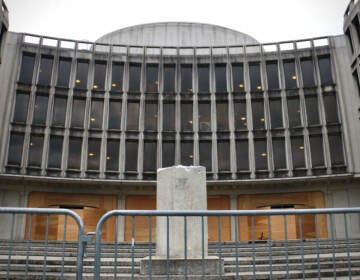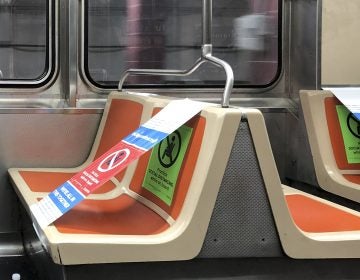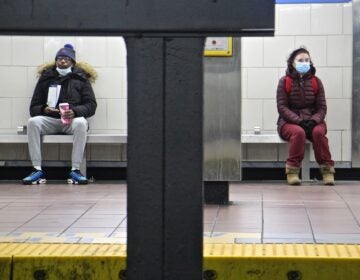Designing at a distance: Coronavirus is changing how Philly architects work
In Philadelphia, designers are responding to the coronavirus pandemic with new ideas — and urgent questions about engaging with community while public life is on hold.
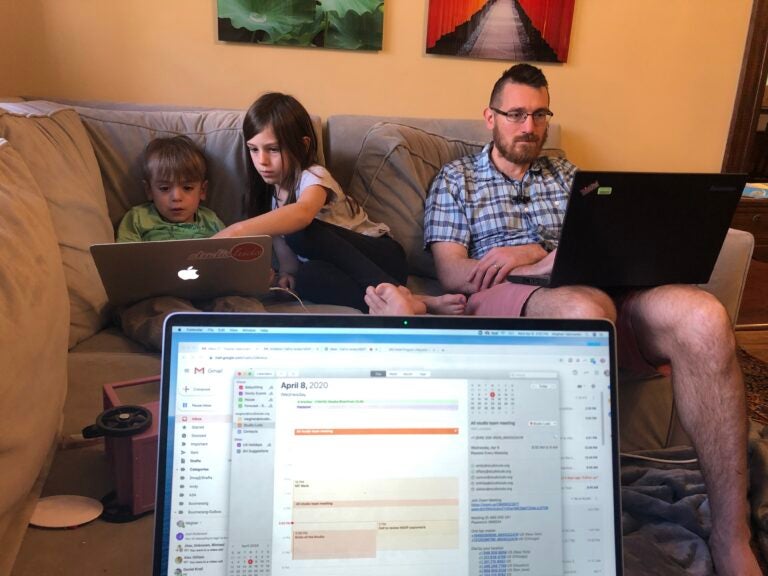
Playground designer Meghan Talarowski took this picture of her post-pandemic workspace, shared with her husband and two children (Meghan Talarowski)
Meghan Talarowski didn’t envision spending the spring inside, assembling thousands of packs of crayons, bubbles, activity sheets, and sidewalk chalk.
Not to mention the distraction of new coworkers sharing her space: her two young children and husband; all of them working from the family’s Philadelphia home.
“This is a tough time, kids and parents are stressed,” Talarowski, the founder and executive director of Studio Ludo, a nonprofit playground design studio and advocacy group. “People are trying to work while being full-time caretakers.”
Talarowski had planned to begin, this summer, a national study of 50 playgrounds in major cities, funded by the National Institute of Health.
But, faced with a statewide stay-at-home order and the NIH project officially on hold, Talarowski pivoted. The landscape designer sensed a new collective need and shifted her focus from playgrounds to Play Packs, expanding the way her team “delivers play” for the time being.
Studio Ludo’s Play Packs offer free creative supplies and activities to help kids and parents combat the social isolation and stress caused by COVID-19. Materials for the packs are supplied by donations from Treehouse Books, Staples, and through direct donations submitted through the nonprofit’s website. They are being distributed at community spaces like the Village of Arts and Humanities, going to families along with boxes of food and other quarantine supplies.
Studio Ludo is donating staff time to coordinate, assemble, and distribute the packs across the city, with a goal to produce 1,200 packs per week until the end of the school year.
The next distribution date will be Friday, April 24, since the next two weeks are critical for social distancing, she said.
Flexibility and creative problem-solving are critical qualities of a good designer. But even for professionals trained in these skills, the coronavirus pandemic presents an unprecedented challenge. In Philadelphia, designers are responding with new ideas — and urgent questions about engaging with community while public life is on hold.
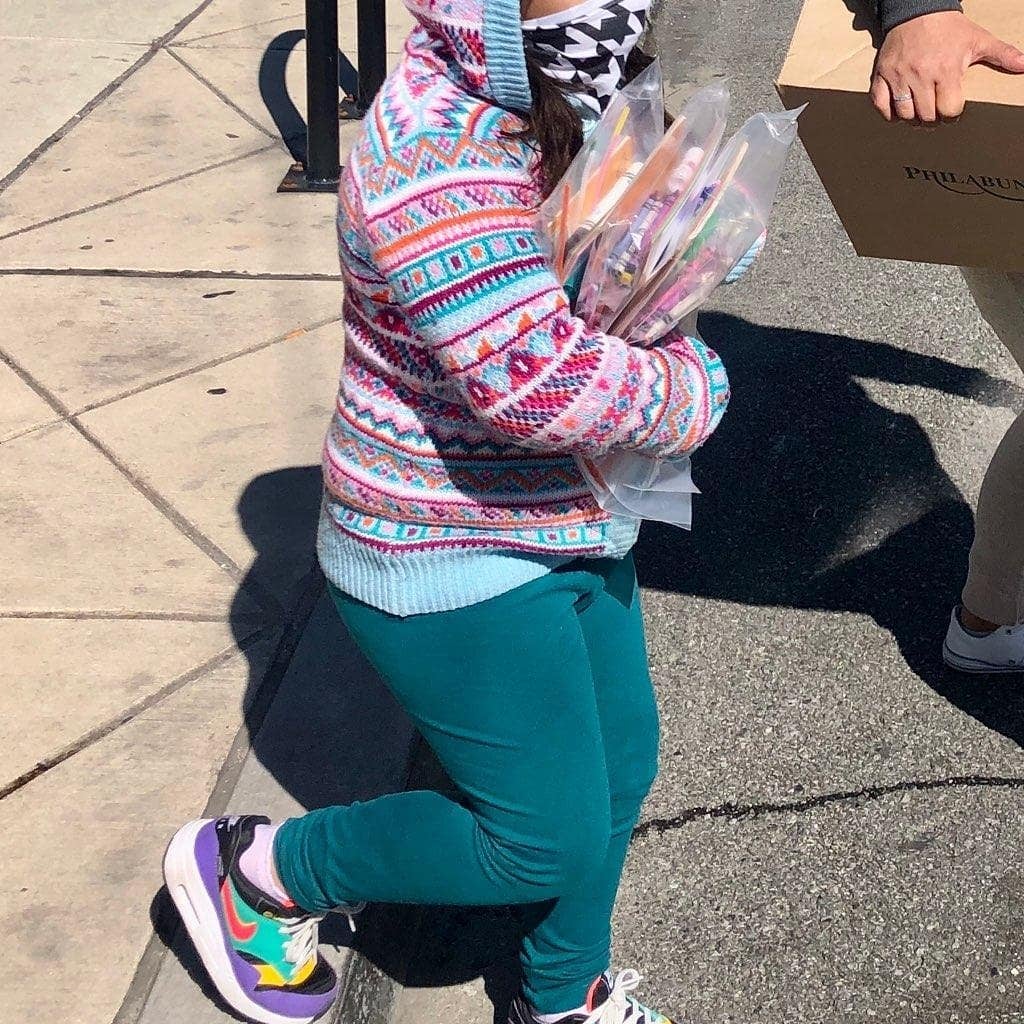
“The weird thing is that we’re still very busy,” says Sara Pevaroff Schuh, founding principal of SALT design studio, a five-person landscape architecture firm dedicated to re-envisioning urban and community spaces.
While it’s possible to perform tasks from home, design is best when done collaboratively.
“Things happen when people are in the same room,” said Schuh. “Energy is generated from other people saying something, or you watching them doing something … we do charrettes all the time in the office.”
A threat to equitable urban design
Community engagement is another key part of the practice that’s not easily replicated in the virtual world.
About 90% of the work SALT does is “intimately tied with community engagement,” Schuh said.
“If this is the new normal for a while, how can we continue to engage communities and the public in the design process?” she asked.
Schuh is particularly concerned about how social distancing requirements might threaten equity in participation for much of the firm’s public work — especially with Rebuild Philadelphia.
“We do a lot of Rebuild work, and it’s the kind of work I’m really passionate about. I don’t want it to suffer because we’re unable to be fair and have meaningful input from people.”
Even if a virtual solution to community engagement were to present itself, many households that SALT would seek to draw into conversations may not have reliable access to the internet.
Capturing the same breadth of participation in an online format would be nearly impossible, Schuh said.
Schuh draws a parallel between the dilemma her firm is facing and that of the Philadelphia School District, which is confronting deep equity challenges in the wake of statewide school closures. “It’s kind of the same problem we’re having, making sure that there’s some kind of equity in the way you reach out to people,” Schuh said.
It’s a problem for which there doesn’t seem to be a viable solution. “It’s a topic we’re talking about every week and we’re brainstorming about how you would do this.”
But Schuh doesn’t anticipate much in the way of developing an alternative for in-person participation and engagement. The plan for now is to wait and reassess in May.
Both SALT and Studio Ludo stressed that the ultimate goal is to retain all of their staff while staying on top of existing deadlines and allowing space for employees to process feelings of anxiety and emotions and deal with their own families. But accommodating all of the constraints, demands, and emotions can be tricky.
“Deadlines haven’t shifted, but the reality is that no one is working at full capacity,” said Talarowski. Still, thinking strategically and looking towards aid options like the Small Business Paycheck Protection Program and small business loans have her feeling hopeful.
‘People pay for architects when they’re flush’
Kenneth Johnson is the founder and president of Architecture, Urban Design and Policy, LLC, a one-man firm that specializes in single-family new construction rowhouses. Johnson rents space in the University of Pennsylvania’s Pennovation Works where he shares an office with a father-son team who also do design work. The three occasionally collaborate on projects.
“[The father is] an older guy, so he was really concerned and stopped coming in about a week before the City shut down … I started working from home when the City shut down,” Johnson said.
Like many smaller, residential architects, Johnson is still swamped with several projects in the pipeline, some of which have qualified for exemptions to continue working despite the state’s shutdown orders. After touching base with clients, he feels confident that all of his existing projects are still moving forward, but he’s nervous about what the next months might bring.
“I need new projects to keep coming in to sustain myself. People pay for architects when they’re flush with cash and when the economy takes a turn, usually architects are the first to feel it,” Johnson said. “My concern as this thing drags out is, if you’ve got a dollar, are you going to spend it with the architect, are you gonna put food on the table, or are you gonna pay your rent?”
For smaller firms, weathering a couple of months of a crisis is one thing, but planning for an uncertain future is different. “The bigger concern is the long-term,” says Mary Holland, president and principal at CICADA Architecture/Planning, Inc., an architecture firm that focuses on cost-effective, sustainable, and contextually sensitive projects.
CICADA will be able to sustain its staff of 20 for the foreseeable future, but Holland said that stability in the architecture and design world could be undermined by a recession. “If the country goes into a recession, we know what happens to architecture when that happens.”
Diversifying project types is one way to ensure a little more resilience through a serious economic downturn.
More “mission-driven” firms like SALT and CICADA, tend to work in the nonprofit and the public sectors, which don’t seem to have been hit too hard yet. Other sectors, like higher education, commercial, and large-scale multifamily may take more of an immediate hit.
CICADA also does a lot of work in affordable housing, an area that has been deemed “essential infrastructure” and allowed to keep working. Casa Indiana, a 50-unit low-income housing project for independent seniors designed by CICADA for the community development group HACE, was about a month away from completion before Gov. Tom Wolfe ordered all construction to shut down. Work paused for a week but was recently authorized to proceed.
Normally, CICADA embraces an open office environment and their workspace is intended to foster exchange with plenty of large tables and space for the team’s designers to congregate, sketch, and share ideas.
“We’re a really collaborative practice,” said Holland, “we really love to get a group of people together around a table together and sketch and come up with ideas and that’s hard to do virtually.”
There’s also a tactile component that can’t readily be replicated online. Choosing finishes and evaluating colors and textures — especially for interior work — is nearly impossible when you can’t gather around the same sample book to physically feel and examine the materials.
All of this time spent sheltering in place may cause us to pause and reflect on how we live, and how we structure our time and our communities, Holland said.
“I do think that people are going to think more seriously about changing the way they live than they have in a very long time,” Holland said. “We’re all forced into a really big change. We as humans go through life avoiding change, right? And it’s been thrust on us, so that opens up our heads to thinking about more change, so that will be interesting.”
WHYY is your source for fact-based, in-depth journalism and information. As a nonprofit organization, we rely on financial support from readers like you. Please give today.




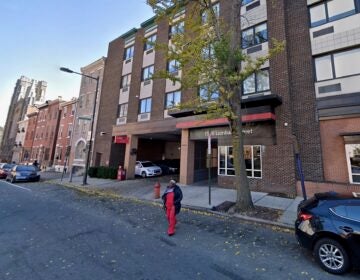
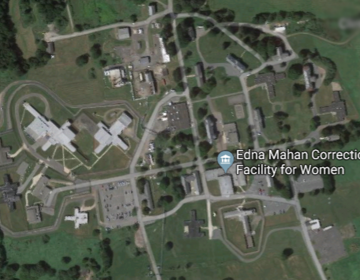

![CoronavirusPandemic_1024x512[1]](https://whyy.org/wp-content/uploads/2020/03/CoronavirusPandemic_1024x5121-300x150.jpg)
